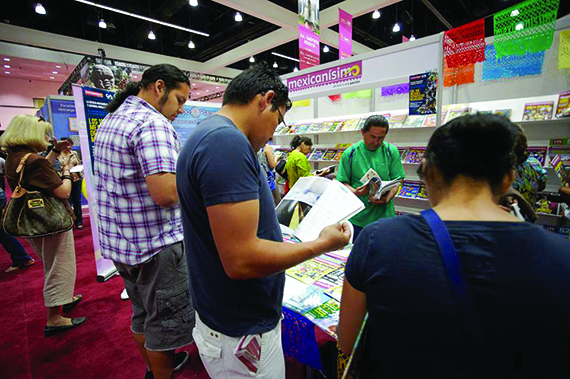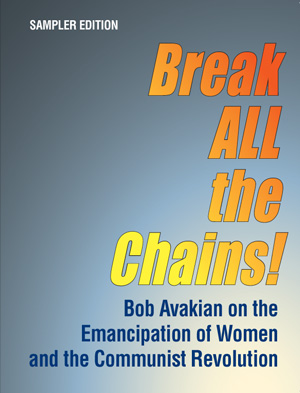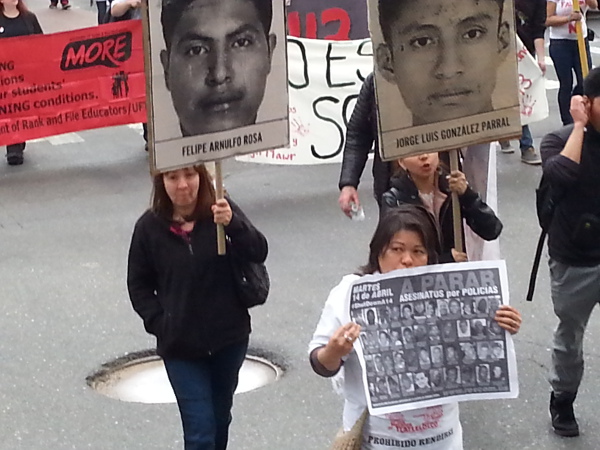Taking Revolution to the Spanish Language Book Fair
June 15, 2015 | Revolution Newspaper | revcom.us
Letter from readers:

LéaLA, organized in Los Angeles by the University of Guadalajara biannually, is the largest Spanish-language book fair in the U.S. (Photo: elpuntosemanal.com)
The scene is an unusual one for a book fair: closing time has passed but the attendees are riveted to the debate, a woman weeps with rage, a panelist shouts, the organizers plead that they need to close...
LéaLA, organized in Los Angeles by the University of Guadalajara biannually, is the largest Spanish language book fair in the U.S. On May 15 to 17, a few of us attended to take out revolution and a leaflet calling for contributors to the emancipation of humanity by supporting the Spanish edition of Revolution/revcom.us, especially by becoming volunteer translators.
One person who had attended two of these fairs in prior years said that “this time I saw it as somewhat different; people are more pissed off, it showed in their posture and the questions they asked in the forums. They are really angry.”
The themes of the workshops, which concentrated on human rights and immigration, speak volumes about what is “pissing off” people, as well as about the very important role of intellectuals in providing the space and information for exposures.

Break ALL the Chains!
Bob Avakian on the Emancipation of Women and the Communist Revolution
For example, in the workshops “Journalism and Violence,” with independent journalists Anabel Hernández, Sanjuana Martínez and Diego Osorio, and “Journalism and Freedom of Expression” with Lidia Caucho and “El Fisgón,” it was repeated that Mexico continues to be one of the most dangerous places in the world for journalists; estimates are that over 100 journalists have been killed and about 20 more disappeared since 2000. Anabel Hernández had to leave due to constant threats (including an attack on her house by a heavily armed group) after the publication of her book Narcoland. She continues making strong denunciations from an investigative reporting program at UC Berkeley. Sanjuana Martínez, who has exposed pedophile priests and narco-políticos, is a target of an especially woman-hating intimidation, like finding that intruders have shit in her bedroom and rifled through her underwear drawer.
Many spoke to the fact that since 2006, when the war against the drug cartels began in Mexico, some 120,000 or 150,000 people have died, more than 25,000 have disappeared, and 300,000 have fled their homes. It was also pointed out that the U.S., under the Initiative Merida (also known as in Mexico as Plan México), is providing helicopters, firearms, tanks, and training of police and soldiers, to the tune of $3.3 billion.
These concerns found expression in cultural and academic workshops, as well. For example, Prayers of the Stolen (Ladydi in Spanish), a haunting novel by Jennifer Clement, was inspired by stories of peasant women in Guerrero digging holes in their corn fields to hide their daughters from the gang enforcers, and by interviews of women in prison in Guerrero.
We kept seeing ways that the outrage and resistance in Mexico and in the U.S. interact.
A bilingual white professional who had mobilized support among U.S. religious communities for a cross-border caravan for an end to violence in Mexico announced in a panel of religious pacifists that the next caravan would focus on building opposition to mass incarceration in the U.S.
 At the book fair, volunteers with Revolution/revcom.us displayed the Stolen Lives poster. They also printed a poster of the faces and names of the 43 disappeared Ayotzinapa students and taped it to the Stolen Lives poster, bringing alive the “painful synergy” between these two horrific outrages. Many people have recognized this synergy, such as the marchers in the photo above. (Photo: Special to revcom.us)
At the book fair, volunteers with Revolution/revcom.us displayed the Stolen Lives poster. They also printed a poster of the faces and names of the 43 disappeared Ayotzinapa students and taped it to the Stolen Lives poster, bringing alive the “painful synergy” between these two horrific outrages. Many people have recognized this synergy, such as the marchers in the photo above. (Photo: Special to revcom.us)
When we displayed the Stolen Lives poster, many people came up to see it or to take one. A panelist, a local university professor, commented: “I have that poster on the door of my office.” How did he get it? “My daughter gave it to me.” In addition, a comrade printed out a poster of the faces and names of the 43 disappeared Ayotzinapa students and taped it to the Stolen Lives one, bringing alive the “painful synergy” between these two horrific outrages.
The passionate debate we mentioned at the beginning arose over the presentation of a novel, Guerra de Guerrillas (Guerrilla Warfare). It turns out that the young author is the daughter of the substitute governor of the state of Guerrero, from the PRD (a leftist mainstream party which had majority control of the state), who was associated with the guerrilla movement previously, and the co-presenter of the book is the head of the state educational system. The PRD only offers the same repression, the same grinding poverty, the exact same narco-politics, because it has never broken with the imperialist system and simply wants its slice of the pie. Millions of people now completely distrust the mainstream left and the electoral system.
Several people in the audience challenged the panelists, demanding justice in the case of the 43 students of the rural teachers’ training college in Ayotzinapa, disappeared at the hands of public security forces (which includes drug gang enforcers) in Iguala, Guerrero, in September 2014, and the freeing of Nestora Salgado, commander of the community self-defense forces in Olinalá, Guerrero, unjustly imprisoned since 2013. The audience applauded the people who expressed their pain and indignation.
Over and over people asked in the workshops, profoundly concerned, “What can we do?” They were left visibly unsatisfied or doubtful when the panelists would respond that they should vote, inform themselves, and/or join organizations. Such responses do not address the problem that the state is a structure controlled by the capitalist class and must continue to be so as long as this system continues.
Hundreds of people took the flyer to support the Spanish edition of Revolution, with many positive reactions; we also got out some 150 copies of Revolution newspaper and a half dozen of the sampler, Break ALL the Chains! Bob Avakian on the Emancipation of Women and the Communist Revolution. Five people took the polemic, “Communism or Nationalism,” by the Revolutionary Communist Organization of Mexico.
A university professor from Mexico took a copy of Revolution and “Communism or Nationalism” when it was raised to him that he and the other panelists only talked of “democracy” when what rules is a bourgeois democracy, and the cause of what is happening in Mexico is capitalism. He was very appreciative that we raised this discussion with him and asked that we keep in contact.
About ten people, aged 21 through 72 years, signed up as volunteer translators for the newspaper and website. They responded to the necessity to provide access to immigrants to the exposure and the solutions that the newspaper and website offer, as well as people who visit the website from 190 countries. For example, one volunteer is from a Latin American country where she used to support a progressive party which was destroyed by repression; she wants to talk more about what the solution is, but she took the Raymond Lotta interview about the experience of past socialist countries and said, “Yes, I want to, because I am not doing anything for the world.”
In sum, during the book fair we learned a lot about the intensifying situation which Mexico is experiencing and the anger and frustration of the masses with the options which they are offered by the politicians and mainstream left in Mexico. There is much greater potential for radical change and for people to discuss communist revolution as a real solution.
Volunteers Needed... for revcom.us and Revolution
If you like this article, subscribe, donate to and sustain Revolution newspaper.





